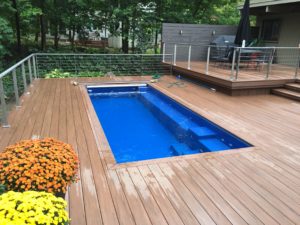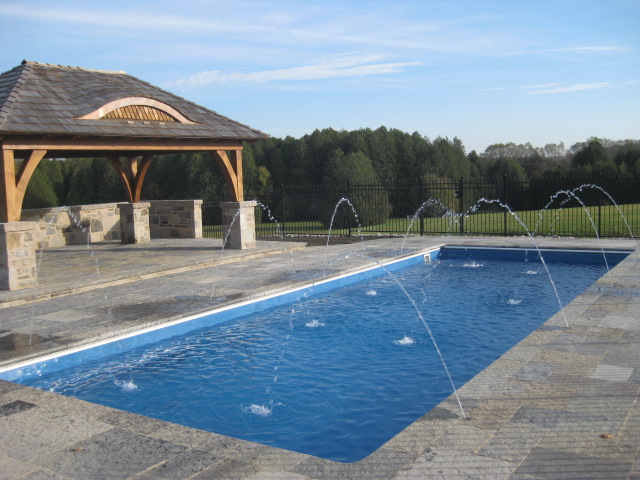Unless you enjoy doing the polar plunge (and some of us do!) a pool heater is one of the best ways to make sure you get the most out your pool when you live in a seasonal climate. Depending on the size of your pool it can take days (even weeks) for the water to warm up on its own once the weather outside gets hot. And you will lose some or all of the temperature you gained during the day if the temperatures are cool at night.
There are several options to choose from when looking at adding a heater to your pool, including natural gas or propane heaters, heat pumps, electric heaters as well as solar panel heating. Here we will give you a little insight into how each of these works and try to help you choose which might be best for you.
Natural Gas/Propane Heaters Natural gas and propane heaters are the most commonly installed heaters on residential swimming pools. This is because they provide the fastest and most controllable heat option. They are not the cheapest nor the most expensive type of heater to initially install, and work for almost anyone who has or can get natural gas or propane service to their home. A lot of people ask how much it will cost to heat their pool over a season, but this is a very difficult question to answer. Everyone’s situation is a little different and the weather plays a big part in the cost (and who can predict the weather for a whole season?). Averages can also be hard to pin down because the cost depends on so many different factors. How often do you use the heater? How warm do you like the water to be? How cold is it outside? How much water is in your pool? How many BTU’s is the heater? Do you consistently use a solar blanket to retain the heat? Do you also have solar panels to offset the gas heater? Do you maintain the temperature consistently or do you only run the heater when you want to use the pool? After writing all this, I realize that this leads us right into ways that you can make your gas heater more cost effective. If you want to make it more affordable to heat your pool, you should initially install the largest BTU heater possible – your pool installer and gas fitter should be able to help you out with this. The larger the heater, the more heat output it will provide, so it takes less time to warm the water. This has two benefits – you can run the heater for shorter periods and you can heat the pool as needed instead of keeping it slightly warm all the time. There are also new devices on the market that allow you to monitor and control your heater remotely, which means that you can check the temperature of your pool while you are away or at work, and decide if you want to turn the heat on so it is ready when you get home. We are particularly excited about this type of technology, as it is both fun and convenient for homeowners who want to get the most use out of their pool. You should also make sure to use a solar blanket or liquid solar cover to prevent heat loss. Some people find it inconvenient to use a solar blanket (putting it on at night, taking it off during the day) so they are not truly enjoying the benefit of it. Liquid solar blanket is also quite effective, you can read more about it in this article. Heat Pumps Heat pumps are not as commonly installed as gas heaters, mainly because a good heat pump can cost double that of a standard gas heater to initially purchase (ouch!). But their operational costs are low because they work smarter, not harder. Heat pumps work by pulling heat from the air and transferring it to the pool water, kind of like a reverse air conditioner. They run on electricity but do not consume a lot of power as they are merely transferring heat using liquid refrigerant instead of generating heat with electricity. Heat pumps can be 5 times as efficient as other types of heaters. You also have the option to program your pump and heater during hours when electricity is cheaper, which can save you some dough. These heaters are really best at keeping your pool water at a steady temperature during swim season. They lack the power to heat pools up quickly or add heat when the air temperature drops below about 10 degrees Celsius (or around 50 degrees Fahrenheit), but this really only matters if you like to swim when it is cold outside. Heat pumps are generally considered to be a good alternative if you do not have access to natural gas or propane at your home. Electric Heaters Most hot tubs use electric heat systems as they are compact, low initial cost, and generally do a good job of heating smaller, insulated vessels of water. Like heat pumps, electric heaters are not designed for fast temperature increases – gas or propane heaters are really the only choice for speed. Electric heaters are available for smaller pools as an low cost alternative if gas and propane are not available. They usually only come in 5, 10 or 15 kilowatt sizes, which are not really big enough to heat larger outdoor pools efficiently. Solar Heating Solar panels have been a trend for heating pools for several years, and can help you keep your pool warmer throughout the swim season. They work well when used in conjunction with gas or propane heaters and can save you some money if you like to keep your water consistently warm. Expect that properly sized and installed solar panels will add between 5-15 degrees of heat on warm, sunny days. Solar heating panels come in a few different designs and can be used on pools of any size. The downside is that the larger the pool, the more panels are required to gain a significant amount of heat, and the panels can be quite large. The surface area of your solar collector should equal 50%–100% of the surface area of your pool. The most popular panels are made of black EPDM rubber which heats up in the sun so that it can heat the water that is slowly circulating inside. The panels should be south facing to attract the most heat. The system runs off of your existing pool equipment, so placement and positioning can pose some restrictions. There are other types of panels available, but all work off the same concept of slowly moving water through tubes that attract or magnify the heat from the sun. The cost to initially install a solar heating system depends on how many panels you need, whether you install an automatic or manual control system, and how it is being installed (can you do it yourself?). A typical system, installed by a professional, including an automatic controller is probably going to run between $3,000-$4,500. This seems like a lot, but the benefit is that this is a one time cost – after the install, you are getting free heat. Some maintenance will be required and of course the panels don’t last forever, but with good care you should expect to get 10-20 years of use out of the system.



